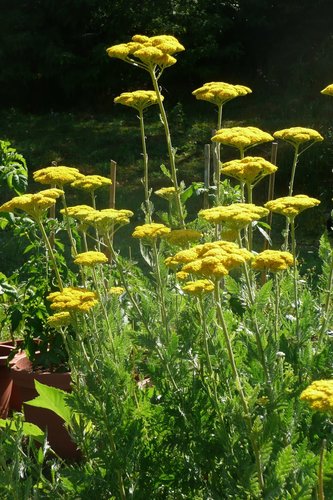Fern-leaf Yarrow
Search
Wikipedia
| Achillea filipendulina | |
|---|---|

| |
|
Scientific classification | |
| Kingdom: | Plantae |
| Clade: | Tracheophytes |
| Clade: | Angiosperms |
| Clade: | Eudicots |
| Clade: | Asterids |
| Order: | Asterales |
| Family: | Asteraceae |
| Genus: | Achillea |
| Species: |
A. filipendulina
|
| Binomial name | |
|
Achillea filipendulina | |
| Synonyms[1] | |
| |
Achillea filipendulina, the yarrow, fernleaf yarrow,[2] milfoil, or nosebleed,[3] is an Asian species of flowering plant in the sunflower family, native to central and southwestern Asia (Kazakhstan, Afghanistan, Pakistan, Iran, Iraq, Turkey, Caucasus).[4] It is also naturalized in parts of Europe and North America.[5][6]
Description
A herbaceous perennial, it grows 4 ft (120 cm) high, with fern-like foliage. The leaves are linear, pinnate, lobed and serrated, hairy and rough. The flowers are arranged in corymbs, or panicles, of a complex character; they are very large, often 5 in (13 cm) across. The smaller corymbs are arched or convex, causing the cluster or compound corymb to present an uneven surface. In the species the small flowers are of rich 'old gold' yellow colour, and are very rigid, almost hard. The flowering period is mid to late summer.[4]
Cultivation
Achillea filipendulina is cultivated in temperate regions as a flowering ornamental plant. Ordinary garden loam and other soils support its growth. It is best grown in full sun, and is drought tolerant when established. Propagation is by seed or root division in spring.[7]
The species has generally been superseded by numerous improved cultivars, of which the following have gained the Royal Horticultural Society's Award of Garden Merit:-
References
| Wikimedia Commons has media related to Achillea filipendulina. |
- ^ The Plant List, Achillea filipendulina Lam.
- ^ "Achillea filipendulina". Natural Resources Conservation Service PLANTS Database. USDA. Retrieved 7 January 2016.
- ^ Shorter Oxford English dictionary, 6th ed. United Kingdom: Oxford University Press. 2007. p. 3804. ISBN 978-0199206872.
- ^ a b Flora of Pakistan, V. 207 Page 41 Achillea filipendulina Lam.
- ^ Altervista Flora Italiana, Millefoglio a foglie di filipendula, praktröllika, Achillea filipendulina Lam.
- ^ Biota of North America Program 2014 county distribution map
- ^ RHS A-Z encyclopedia of garden plants. United Kingdom: Dorling Kindersley. 2008. p. 1136. ISBN 978-1405332965.
- ^ "Achillea 'Coronation Gold'". RHS. Retrieved 27 February 2020.
- ^ "Achillea 'Credo'". RHS. Retrieved 27 February 2020.
- ^ "Achillea filipendulina 'Cloth of Gold'". RHS. Retrieved 27 February 2020.
- ^ "Achillea filipendula 'Gold Plate'". RHS. Retrieved 27 February 2020.
- ^ "Achillea 'Heidi'". RHS. Retrieved 27 February 2020.
- ^ "Achillea 'Hella Glashoff'". RHS. Retrieved 27 February 2020.
- ^ "Achillea 'Lachsschönheit' (Galaxy Series)". RHS. Retrieved 27 February 2020.
- ^ "Achillea × lewisii 'King Edward'". RHS. Retrieved 27 February 2020.
- ^ "Achillea 'Lucky Break'". RHS. Retrieved 27 February 2020.
- ^ "Achillea 'Martina'". RHS. Retrieved 27 February 2020.
- ^ "Achillea 'Mondpagode'". RHS. Retrieved 27 February 2020.
- ^ "Achillea 'Moonshine'". RHS. Retrieved 27 February 2020.
- ^ "Achillea 'Summerwine'". RHS. Retrieved 27 February 2020.
- Wood, John (2006). Hardy Perennials and Old Fashioned Flowers. Project Gutenberg Literary Archive Foundation.
- This article incorporates text from the Hardy Perennials and Old Fashioned Flowers by John Wood, a publication now in the public domain.
